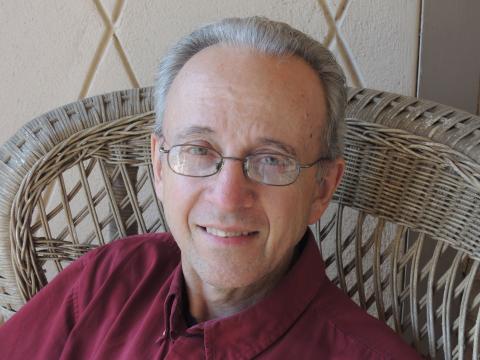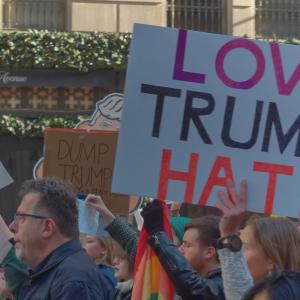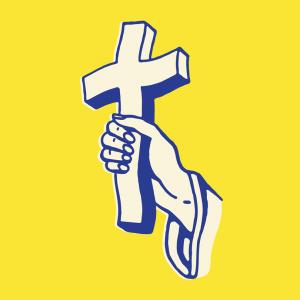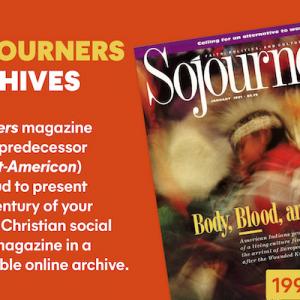
Joe Roos, a founder of Sojourners, is a Mennonite pastor and trustee of Friends of Sabeel North America, a Christian organization seeking support for Palestinian freedom in U.S. churches.
Posts By This Author
Christian Zionism Takes Root in Latin America
The political Zionist movement has little to do with Christianity — and it’s a threat to both democracy and religious freedom.
IN LATE MARCH, when Far Right former Brazilian president Jair Bolsonaro returned from self-imposed exile, supporters greeted him with chants of “God, family, and liberty,” harkening back to the motto of the dictatorship that ruled Brazil from 1964 to 1985. Overwhelming political support from evangelical Christians — similar to that received by Donald Trump — had swept Bolsonaro into office in 2018. Both men repaid this support by moving their respective embassies from Tel Aviv to Jerusalem, actions that were long sought by conservative Christians in the West, signaling a rejection of Palestinian aspirations for independence.
Brazil is only one of the countries in Latin America where right-wing evangelical Christians have become a political force. Today, evangelicals constitute about 27 percent of Brazil’s population, compared to about 25 percent in the United States, according to the Pew Research Center. As the number of Latin American evangelicals has soared in recent years, Christian Zionism has also risen as a political and cultural force in the region.
Christian Zionists believe that support for the modern secular state of Israel is a scriptural obligation with theological ramifications for the “end times.” Too often Christian Zionists defend Israel while perpetuating Christian supremacy and antisemitism; they remain ignorant of the persecution of Jews throughout history. Adopting uncritical, religiously motivated support for the secular state of Israel, Christian Zionists provide cover for Israel’s internationally recognized human rights abuses against Palestinians. The embrace of Christian Zionism threatens to be as damaging to marginalized communities in Latin America as it has been to Palestinians.
Keeping the Faith in Trump's America
Six accounts of resistance and healing in the era of Trump.

Jmaggiophoto / Shutterstock.com
"In the wake of this election, the role of faith communities is imperative," writes Jim Wallis in "Resistance and Healing." With this in mind, we asked a few Christian leaders how followers of Jesus can best practice resistance and healing in Trump's America. Though varied, the responses we received have a common theme: Christians must stand in solidarity with the vulnerable. Now and always. —The Editors
Resistance is Holy Work
by Brittany Packnett
RESISTANCE IS HOLY WORK. Resistance is what it means to tell the truth and defend people in public, even—and especially—when it is inconvenient, dangerous, and uncomfortable.
What truths must we tell? We must tell the truth that the entire world is not white, straight, Christian, cis-gendered, American-born, male, or able-bodied, and that those of us who aren’t matter just as much as those of us who are. We must tell the truth that rhetoric and policies that encourage violence against those same people is not of God and not of the freedom we espouse. We must tell the truth that if all of us were truly created equal, then the cancer of xenophobia makes all of us sick—and that none of us are truly free until we are all free.
We did not lose an election as much as we validated and normalized a way of life that is beneath our humanity—and, therefore, which requires our resistance. The Christ I serve did not sit idly by in times like these—for in eras like this one, inaction is a sin. Inaction perpetuates this latest wave of hate just as much as if you painted a swastika yourself. Hate should never be welcome in our homes, at our tables, in our worship, or in our country.
It is holy to resist such things. Holy resistance means calling out that hate by name and casting it out of where you are—of where you want God to be. Casting it out means no longer making excuses that your grandfather just talks like that because he is elderly; it means withholding your tithes and membership from those places that will not be safe havens and sanctuaries for those persecuted under potential new rules of law; it means challenging the notion that we stitch together a false unity rather than acknowledge the explicit danger many of us are now placed in.
Holy resistance means praying for those who persecute—but protecting the persecuted. Christians must be people of moral conscience, those who conscientiously object to hatred, division, racism, and sexism as unashamedly as we claim Christ. The call to be in the world and not of it was for such a time as this—we must be the light that shines on injustice and calls out our humanity to replace the evil we see.
Resistance is holy work. That makes it our work.
The Fall of Chile
What is really going on in Chile.
Last year in France, Kennecott Copper brought legal suit against the government of Chile in relation to the nationalization of their El Teniente copper mine. In a summation before the French Court, Kennecott lawyers acknowledged that their actions were an exercise in “teaching Chile the political realities of life.” On 11 September 1973, the world watched as Chile learned its lessons well.
On that morning the Chilean Navy seized control of the important port city of Valparaiso and broadcast a demand “that the President of the republic must proceed immediately to hand over his high office to the Chilean armed forces and police.” President Salvador Allende Gossens quickly left for the presidential palace, La Moneda, to repel the second military attempt at coup d’état in four months. From the beginning this one looked more serious. He told his wife over the phone that “there’s an uprising of the navy and many riots in Santiago. I don’t know whether we can resist or not. These are very difficult moments. Let’s hope we come out all right.” As the crisis deepened, Allende increased his determination to see it through to the end. In his public statement, made by radio as two airforce jets screamed over La Moneda, Allende said: “I will not resign. I will not do it. I am ready to resist with whatever means, even at the cost of my life in that this serves as a lesson in the ignominious history of those who have strength, but not reason.”
From the Archives: June 1982
Eating the Bread of Anxious Toil

NATALIA61 / Shutterstock
IT WAS after midnight at the end of another long, busy day, and I had an early breakfast meeting the next morning. I decided to read a psalm before I turned off the light and, with no particular rhyme or reason, settled on Psalm 127. Although I have read this psalm before, I was completely unprepared for the shock it gave me that night.
Verse two caught me completely off guard: “It is in vain that you rise up early and go late to rest, eating the bread of anxious toil.” I was struck right between the eyes. There could not have been a more vivid and disturbingly apt description of my life and the lives of most people I know here at Sojourners and elsewhere.
An Inclusive Islam
War Crimes and Misdemeanors
Christopher Hitchens, in this illuminating assessment of Henry Kissinger's war crimes, reports on a filmed 1998 interview with Michael Korda, senior editor of Simon and Schuster.
The Cry of the Poor
THE OLD TESTAMENT prophets claimed, and the New Testament witnesses affirmed, that a society will be judged (by God) most fundamentally by the way it has treated the poorest and most marginalized in its midst.
The IRS: On Our Case
In the late 1960s and early 1970s, the U.S. government conducted a well-orchestrated campaign of intimidation and harassment against opponents of the Vietnam War.
Publisher's Memo
Since our beginning 15 years ago, we have always felt a strong sense of family with you, our readers.
High Marks for Billy Graham Crusade
The eight-day crusade, attended by more than 150,000 people and involving 630 churches from Washington, D.C, Maryland, and Virginia, took place in late April and early May. Nearly one-third of those attending came from Washington's black community.
Pulling the Pentagon's Plug
If your 1985 federal tax liability totaled $4,000, nearly half that amount--$1,720--was used to finance current and future military goals.
Schemes and Devices
The far-reaching tentacles of the U.S. surveillance network.
Listening in on The Church
Government surveillance of faith-based groups in the mid-1980s.
'It's Only Just Beginning'
The week between Christmas and New Year's is usually quiet around Sojourners Community.




